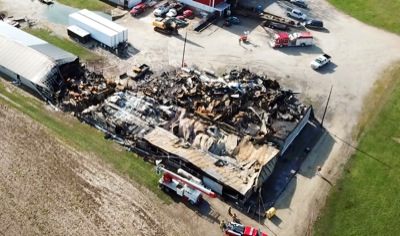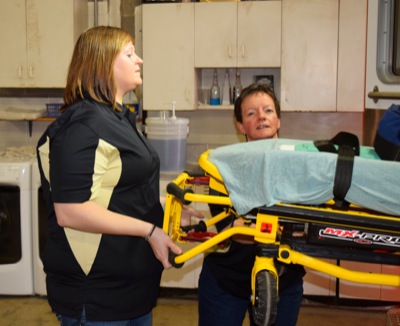Thursday, April 19th, 2018
Feds may help county protect voting system
By William Kincaid
CELINA - Mercer County Board of Elections members are considering accepting federal services to further safeguard the local voting systems.
Board members at their regular meeting this week went into an approximately hourlong executive session to discuss available U.S. Department of Homeland Security services.
Board chairman Phil Long called for the executive session, citing the need "to discuss details of security arrangements and emergency response protocols where disclosure could be expected to jeopardize the security of the public body or public office."
After returning to regular session, Long made a motion to grant directors Laura Bruns and Deb Sneddon "permission to contact Homeland Security, Secretary of State, whomever you need to … for further information."
Board members then moved to approve that motion.
"It should be an understanding that Laura and Deb will work with the (county) IT department regarding the previous memorandum of understanding and again bring a recommendation back to the next meeting regarding the operating procedures," Long said.
Bruns provided a brief summary of the executive session.
"When the Department of Homeland Security (declared) elections (as) critical infrastructure, they offered a variety of services to test and check our systems," Bruns told the newspaper. "So we are discussing ways that we can maybe implement some of those."
Elections officials will revisit the matter during their next meeting on May 8, Election Day.
Ohio Secretary of State Jon Husted on April 11 reminded all county boards of elections of important security precautions and practices.
"Prior to the November 2016 Presidential Election and the 2017 General Election, my office issued guidance to boards of elections regarding security best practices and precautions," Husted wrote. "Because cybersecurity threats are an ongoing concern, this Directive is to underscore the importance of these security practices and precautions and ensure that they are being routinely exercised."
Husted told officials to "take advantage of the cyber hygiene and risk and vulnerability assessment services offered by the U.S. Department of Homeland Security."
Government efforts to protect state and local elections from Russian cyberattacks in 2016 didn't go far enough, leaders of the Senate intelligence committee said last month as the panel released recommendations to safeguard against foreign meddling in the ongoing 2018 primary season.
Federal warnings last time did not provide enough information or in some cases go to the right state and local officials, the committee's leaders said. They reiterated that no evidence has suggested that votes had been changed.
The committee's recommendations include urging states to ensure voting machines have paper audit trails and can't be connected to the internet. Senators also are pushing for better communication among the various U.S. intelligence agencies and federal, state and local governments about cyberthreats and computer vulnerabilities.
Senators also are urging state and local election officials to use resources provided by the Homeland Security Department, such as comprehensive risk assessments and remote cyberscanning of their networks to spot vulnerabilities. Overall, experts say far too little has been done to shore up those vulnerabilities in 10,000 U.S. voting jurisdictions that mostly run on obsolete and imperfectly secured technology.
In other news this week, board members talked about early voting for the May 8 primary election.
Long said as of Tuesday morning 55 in-person early ballots had been cast in the board of elections office.
"Maybe a little more than that in mail," Bruns added. "And we started just finally getting ballots back yesterday."
Husted this week announced that 116,272 absentee ballots had been requested by mail and in-person for the May 8 primary election by the close of business Friday. Thus far, 11,524 Ohio voters have cast their ballots, he said in a news release.
Early absentee voting started April 10. Requests to vote by mail must be in writing addressed to the board of elections no later than noon May 5. Application forms are available on boards of elections' websites.
Ohio voters can cast absentee ballots by mail or in person before Election Day without giving a reason.
The early in-person voting schedule at the board's office at the Mercer County Courthouse is 8 a.m.-5 p.m. through April 27, 8 a.m.-7 p.m. April 30-May 4, 8 a.m.-4 p.m. May 5, 1-5 p.m. May 6 and 8 a.m.-2 p.m. May 7.
- The Associated Press contributed to this story.




